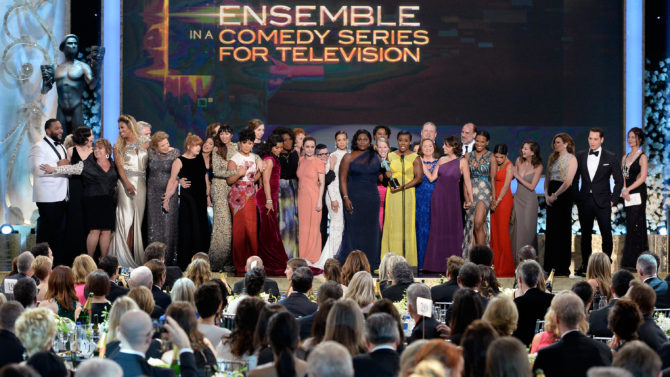
In a year in which no actors of color were nominated for an Oscar, the 21st annual Screen Actors Guild Awards — whether intentionally or inadvertently — made a statement loud and clear about diversity.
By recognizing Uzo Aduba from OITNB as leading actress in a comedy series and Viola Davis from “How to Get Away With Murder” as best actress in a drama series, the thespian-focused awards show made it clear that portrayals of women, minorities and the LGBT community matter — at least on the small screen.
As Variety points out, the SAG Awards on Sunday night made more than a statement; they also made history: 2015 marks the first year in which both winning lead actresses are non-white.
Aduba, who bested industry darlings like Edie Falco, Julia Louis-Dreyfus and Amy Poehler, pointed out in her emotional acceptance speech that the day she got the OITNB gig as Suzanne “Crazy Eyes” Warren was the day she had given up on acting, and thanked the Netflix team for taking a chance on a different kind of show. “I want to thank Jenji Kohan for writing a show like this and putting something like this on television, not just for myself, but for our incredible team of actors to be seen in such a beautiful way,” said Aduba.
Later that evening, Aduba was joined by Laverne Cox, Danielle Brooks, Dascha Polanco, Selenis Leyva, Elizabeth Rodriguez, Diane Guerrero, and the rest of the OITNB cast to receive the Outstanding Performance by an Ensemble in a Comedy Series Award. It was a rare moment in which the stage at a major awards show actually resembled what America looks like.
SEE ALSO: SAG Awards: Latino Winners & Nominees Through the Years
Davis, who is only the third non-white actress to win in her category (Chandra Wilson and Sandra Oh won in 2006 and 2005, respectively, both for “Grey’s Anatomy”), thanked the show’s creator Shonda Rhimes and ABC Entertainment Group president Paul Lee during her acceptance speech “for thinking that a sexualized, messy, mysterious woman could be a 49-year-old, dark-skinned, African American woman that looks like me.”
Earlier, on the red carpet, Davis pointed out an undeniable truth: “It starts with the casting,” she said. “It starts with the narratives. The narratives have got to be inclusive. We’re in the 21st century now. People are multicultural now. We know more now about the world and what the world looks like, and it’s got to be reflected in the scripts.”
The SAG Awards have historically recognized the work of Latino, African American, and other non-white actors on television since its early days. In the first awards show in 1995, Raul Julia, Hector Elizondo and Jimmy Smits were all nominated (Julia and Smits both won, for “The Burning Season” and “NYPD Blue,” respectively). America Ferrera made history in 2007 by winning the SAG Award for Outstanding Performance by a Female Actor in a Comedy Series, becoming the first Latina to take home that honor. Ferrera, in turn, paved the way for other Latina actresses doing comedy on TV, such as Gina Rodriguez from “Jane The Virgin,” who was recognized earlier this month with a Golden Globe. Though the SAG Awards gave out the best ensemble in a comedy series award tonight to newcomer OITNB instead of long-time favorite “Modern Family,” Sofia Vergara remains the Latina with the most SAG nominations ever (nine total and four wins), all for the latter.
But while diversity on TV was celebrated on Sunday night, film is clearly lagging behind. The Martin Luther King Jr biopic from director Ava DuVernay “Selma” got shut out of all the major guild awards shows this year, an issue which some attribute to racism and others to the fact that Paramount did not send screeners to guild voters.
Traditionally, the SAG Awards have been strong indicators of what to expect on Oscar night, since the voting bodies for both organizations overlap quite a bit.
It remains to be seen how “Selma” will fare in the Best Picture race at the Oscars, but for now, television can savor this new era of storytelling on the small screen.






